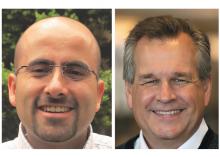Mennonites around the globe yearn for Anabaptist theological education, identity formation and leadership development, but attending an Anabaptist-related college, university or seminary has not been possible for Mennonites in many countries. A new partnership has been designed to respond to this need.
Mennonite World Conference (MWC) and Anabaptist Mennonite Biblical Seminary (AMBS), Elkhart, Ind., have forged a new agreement to provide Anabaptist-based theological and church leadership education to Anabaptists around the globe in both for-credit and non-credit formats. Pastors and church leaders will be able to take courses in biblical and theological studies and church history and ministry, in their home countries.
A memorandum of understanding between MWC and AMBS lays out the details of what César García, MWC’s general secretary describes as a response to a 2003 call for “sharing of gifts” among MWC member churches. AMBS is owned by Mennonite Church Canada and MC U.S.A., which are two of 107 member churches of MWC.
“We perceive this relationship with the seminary as a gift that we are receiving from [MC Canada and MC U.S.A.] in order to support global Anabaptist churches,” says García.
Rapid growth creates need to equip leaders
While, on the whole, membership is declining among Mennonite churches in the United States and Canada, many Anabaptist-Mennonite churches in the Global South are growing rapidly. Along with this growth comes a need for leaders grounded in Anabaptist faith and theology.
This need has become more urgent as the Anabaptist family has expanded around the world, says García, adding, “Now that most of our Anabaptist member churches are in the Global South, we have a huge need to do theology from an Anabaptist perspective in each context.”
He says that popular evangelical, fundamentalist and charismatic preachers influence theological development in MWC congregations around the world through their online platforms.
“When we lack Anabaptist identity, it is so easy to absorb the influence of these theologies without entering into a real conversation with them,” he says. “We want to help our churches enter into a discerning dialogue instead of blindly receiving from other traditions.”
Joining gifts to build up the church
AMBS leaders have been working to make Anabaptist educational offerings available to church leaders around the world—in their own contexts. Beginning in 2017-18, Sara Wenger Shenk, the former AMBS president, led an initiative to recruit participants for seminary courses and certificate programs that students could engage in from a distance.
Conversations between García and Wenger Shenk—and subsequently with AMBS’s incoming president, David Boshart—about working together to strengthen Anabaptist identity in the global communion led to a meeting in January of this year to formalize the new partnership. The shared memorandum of understanding was affirmed in March and April by Mennonite Education Agency and MC Canada executive leaders, MWC Faith and Life Commission leaders and executive committee members, and the AMBS board of directors.
According to the partnership document, both MWC and AMBS are dedicated to strengthening the life and ministry of the churches they serve and to cultivating their rich heritage as Anabaptist organizations. They see their new partnership as a way to join their gifts in building up the church and its ministries together.
Among the gifts that MWC brings to the partnership are an extensive network of international relationships and connections, communication channels and an accountability structure. MWC leaders will help identify professors from around the globe who can offer global perspectives as sessional faculty members at AMBS. They will also promote program and course offerings to member churches.
AMBS brings more than 70 years of experience in educating church leaders from an Anabaptist perspective, including many international students. In 2019-20, international students represented 25 percent of the graduate student body and 29 percent of participants in the seminary’s nondegree Journey Missional Leadership Development Program. Since the launch of AMBS’s distance-friendly Master of Divinity Connect Program in 2013, faculty members have gained experience in online instruction. The seminary’s teaching and administrative faculty are creating curricula and curating library resources that are increasingly attuned to global contexts.
Gifts for mutual growth
Both García and Boshart have high hopes for this sharing of gifts for mutual growth.
“These educational opportunities will equip new leaders in the global church with more awareness of the tradition to which they belong—and with the capacity to enrich other traditions with our distinctives while also receiving from others,” says García.
Boshart agrees, saying, “I think this can only be good for a more unified and clarified sense of Anabaptist identity for the global communion, as AMBS meets educational institutions around the world to think together about what it means to be Anabaptist in the world today.”




Add new comment
Canadian Mennonite invites comments and encourages constructive discussion about our content. Actual full names (first and last) are required. Comments are moderated and may be edited. They will not appear online until approved and will be posted during business hours. Some comments may be reproduced in print.